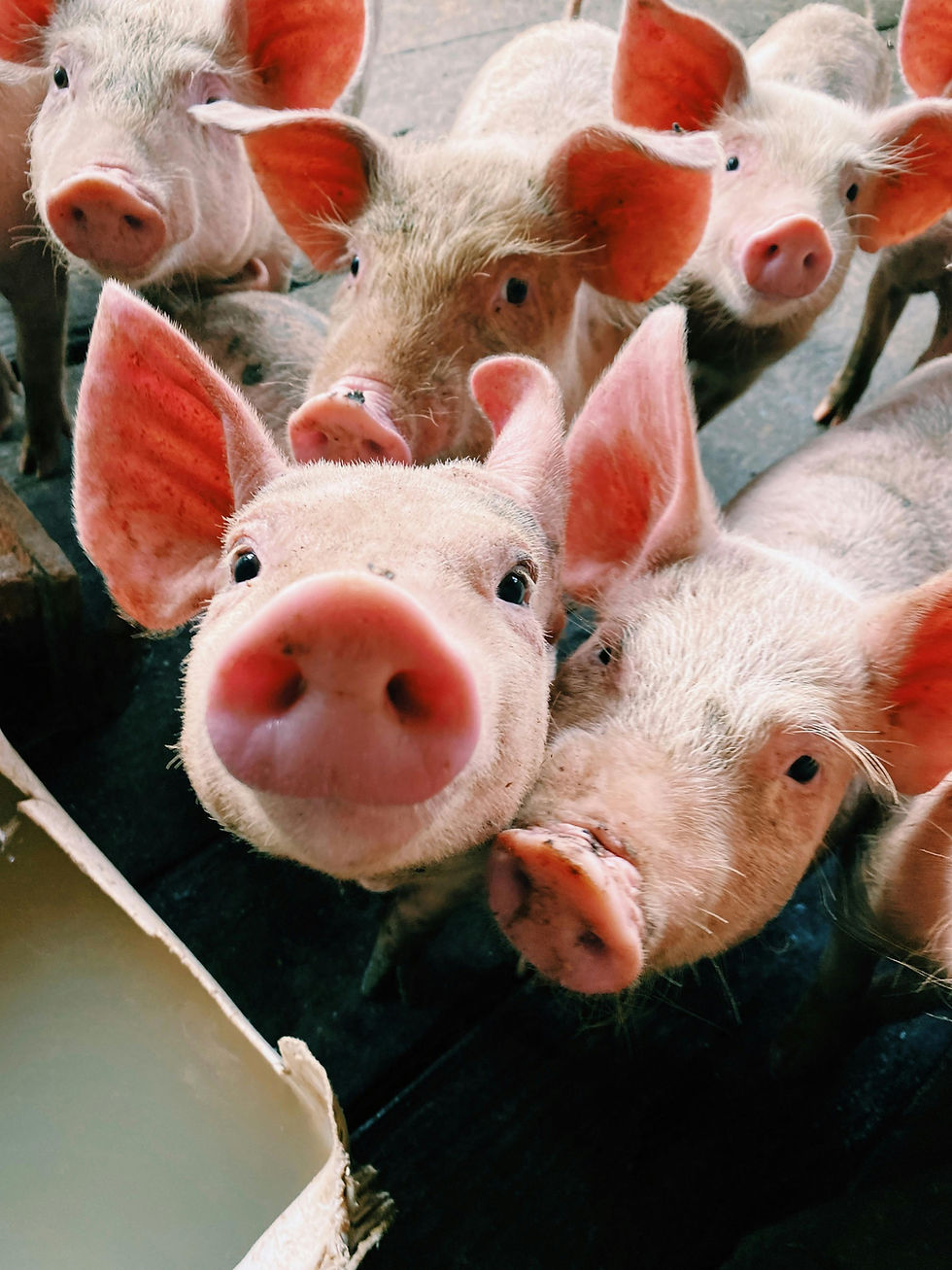Oink Oink
- TF
- Jul 16, 2025
- 3 min read
Updated: Sep 27, 2025
There's been a lot of talk about pigs lately. The FDA approved pig livers for a dialysis-like treatment. The fourth patient received a pig kidney. Scientist grew human-like teeth in tiny pigs. Wild pigs are trying to cross the border, and J. Craig Venter Institute and partners are innovating against the African swine fever.

The business of xenotransplantation, transplanting organs from one species to another, emerged as a possibility back in 2011 when United Therapeutics acquired Revivicor. Revivicor was founded by Dr. David Ayares in 2003 and developed by UK-based PPL Therapeutics—the business known for cloning Dolly the sheep in 1996. Post acquisition, in 2020, Revivicor developed the first FDA approved genetically modified pig, GalSafeTM, which was approved for both human consumption and therapeutic uses.
To date:
There have been two (2) pig heart transplants in total, both American males in their late 50s. Both patients have passed. The first patient died after two months due to a reported pig virus in 2022; the second person died 40 days after surgery, reportedly due to organ rejection antibodies in 2023.
Four (4) patients have pig kidneys. Two females and two males. Two patients have passed. The third patient had the genetically modified pig organ removed after 130 days. The fourth patient received their pig kidney on January 25, 2025 and is alive and thriving.
Pig-human transplants systems that are external to the body are now being tested.
In June 2025, United Therapeutics' subsidiary, Miormatrix, provided a bioengineered pig-human liver that sits outside the body to a patient experiencing liver failure. (The liver system is manufactured by recellularizing a decellularized pig liver with human endothelial cells and human liver cells obtained from donated human livers.)
Also, a clinical trial has recently been approved by the FDA that uses genetically modified pig livers as a dialysis-like treatment. The external pig liver is used to filter the patient's blood—similar to a dialysis machine. The trial includes 20 patients. The pig producer is eGenesis, a U.S.-based biotech company cofounded by George Church, and the device manufacturer is OrganOx, an Oxford University spin-out.
Based on 2025 data by Health Resources and Services Administration, U.S. Department of Health & Human Services' Organ Procurement and Transplantation Network, more than 100 thousand people have registered for organ transplants, with approximately 99 thousand of those individuals requiring a kidney and nine thousand requiring a liver.
The aim to regrow teeth has been a goal for decades (small functioning bioengineered teeth have been grown in rodents) and now scientists are growing bioengineered teeth inside the mouths of Yucatan minipigs.
Regenerative dental researchers at Tufts University combined soft tissue cells from healthy human teeth cells (obtained from discarded wisdom teeth) with pig jaws that were sourced from slaughterhouses (not Sinclair Bio Resources). The cells were then cultured in the lab, attached to a bioengineered scaffold and implanted into the mouths of adult minipigs. The experiment lasted only a few months so human-pig teeth didn't emerge but tooth tissue formation has been observed.
Within the next decade, it's been reported that Tuft's team intends to stop using pig cells altogether—and aims to figure out how to stimulate tooth growth inside the human jaw via signaling molecules.
Increasingly, wild pigs are being reported for damaging property, crops and forests across several states across the U.S., according to the USDA, Animal and Plant Health Inspection Service. The National Feral Swine Damage Management Program remains in effect.
The USDA has conducted multiple-day aerial operations to control feral hogs, (hunting wild pigs is legal in the US) and the U.S. Fish and Wildlife Service have even asked people to eat more wild pigs in its article, "Eat the Invaders.' (Recipe ideas are included.)
Although African swine fever virus (ASFV)—a highly contagious lethal disease among wild and domesticated pigs has never occurred in the U.S.—an outbreak would shock the global pork industry.
J. Craig Venter Institute (JCVI), the the Friedrich-Loeffler-Institut (FLI), and the International Livestock Research Institute (ILRI) have joined together to build a cutting-edge reverse genetics system poised to transform ASFV research.
Detailed in a recent issue of Science Advances, this synthetic genomics-based tool allows scientists to engineer genetically modified ASF viruses rapidly—an innovation slated to reshape the fight against viral diseases. Based on an Iowa State University study— if ASFV did reach the United States— it could result in economic losses exceeding $50 billion over a ten-year period.
The pig trend is ongoing. Back in 2019, scientists restored some functions in a pig's brain hours after death. In 2022 researchers used AI to try to understand exactly what pig calls meant —and whether or not they were happy or sad.


